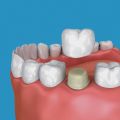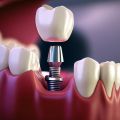Debunking 10 Myths About Dental Crowns

Dental crowns are a common restorative dentistry procedure that helps restore damaged teeth to their normal form and function. Despite their widespread usage and efficiency, dental crowns are riddled with myths and misunderstandings. Addressing these misconceptions is critical to ensuring patients receive proper information when choosing this dental surgery. In this article, we will debunk ten common myths about dental crowns, providing you with the facts you need to make informed decisions about your dental health.
Myth 1: Dental crowns are painful
One of the most widespread misunderstandings about dental crowns is that the procedure of their placement causes severe pain. In truth, the procedure is virtually painless. Dentists often employ local anesthetic to numb the treated area, ensuring you experience minimal discomfort during the crown placement procedure.
Myth 2: Dental crowns are noticeable
Many people are concerned that dental crowns will be obvious and affect their appearance. But the truth is that dental crowns are designed to match the form, size, and color of your natural teeth. Crowns may be made to blend in with your natural teeth thanks to developments in dental technology.
Myth 3: Dental crowns are only for cosmetic purposes
While dental crowns may significantly improve the appearance of your smile, their benefits go beyond cosmetics. They are most commonly used to repair the structural integrity and functioning of damaged or decaying teeth. Crowns provide a long-term treatment that maintains fragile teeth from additional harm while also enhancing dental health.
Myth 4: Dental crowns require extensive maintenance
Contrary to common misconception, dental crowns do not need much care. They need to be brushed, flossed, and taken to the dentist on a regular basis, much like natural teeth. You may extend the life and durability of your dental crown by practicing proper oral hygiene.
Myth 5: Dental crowns are fragile and prone to breakage
Another common misconception regarding dental crowns is that they are fragile and easily broken. However, dental crowns are made of long-lasting materials like porcelain, zirconia, or metal alloys. These materials add strength and resistance to the crown, letting it endure regular biting and chewing pressures.
Myth 6: Dental crowns are only for older adults
Dental crowns are suitable for people of all ages. They can help manage various dental issues, such as tooth decay, fractured teeth, malformed teeth, and big fillings. Dental crowns can be an excellent way to improve your smile whether you are a teenager, a middle-aged adult, or an elderly person.
Myth 7: Dental crowns cause sensitivity
Some people assume that receiving a dental crown will make their teeth more sensitive. Even though temporary sensitivity is typically felt just after getting a crown, it usually goes away in a few days. In reality, dental crowns can help protect exposed tooth surfaces, minimizing discomfort in the long run.
Myth 8: Dental crowns always require root canal treatment
While root canal therapy is occasionally required before installing a dental crown, it is not always necessary. Root canal treatment is frequently necessary when the pulp of a tooth becomes infected or damaged. If the tooth beneath the crown is in good condition, your dentist may not need to conduct a root canal before installing the crown.
Myth 9: Dental crowns are permanent
Dental crowns are intended to endure a long time, although they are not always permanent. A crown's lifespan is determined by various factors, including oral hygiene habits, frequent dental check-ups, and the materials used. Dental crowns can survive for many years if properly cared for, but they may need to be replaced periodically due to wear or injury.
Myth 10: Dental crowns stain easily
Many people are concerned that dental crowns will get stained or discolored over time. Modern dental materials used for crowns, such as porcelain, are extremely stain resistant. They are intended to imitate the natural translucency and color of your teeth. While the crown itself does not stain, the natural teeth surrounding it can, so maintaining good oral hygiene and avoiding staining substances such as tobacco, coffee, and red wine can help keep the look of both your natural teeth and your dental crown.
Other articles and publications:
Articles and publications of other companies:
- +1 (646) 270-9836
- Long Island City
- grantny.com












